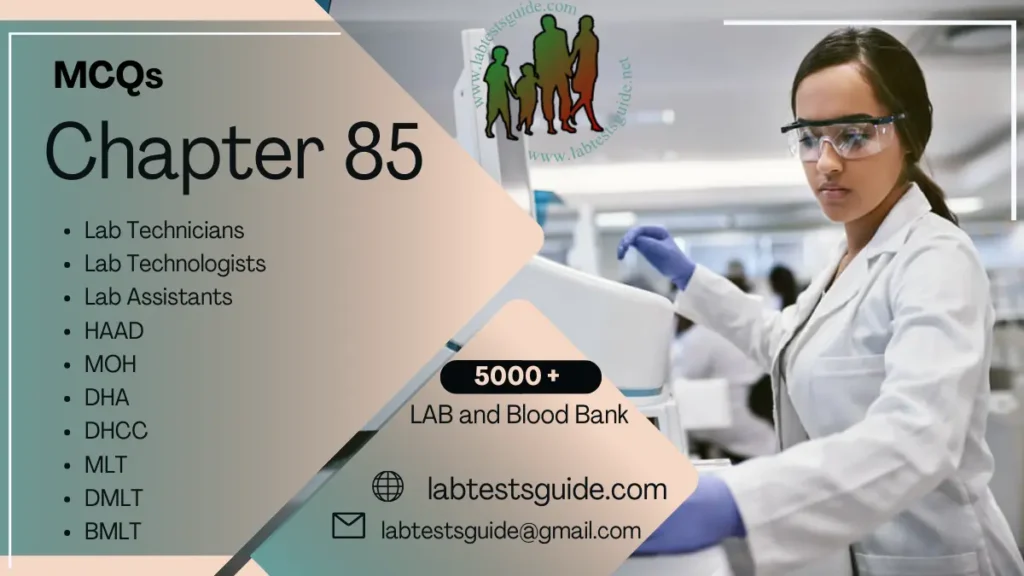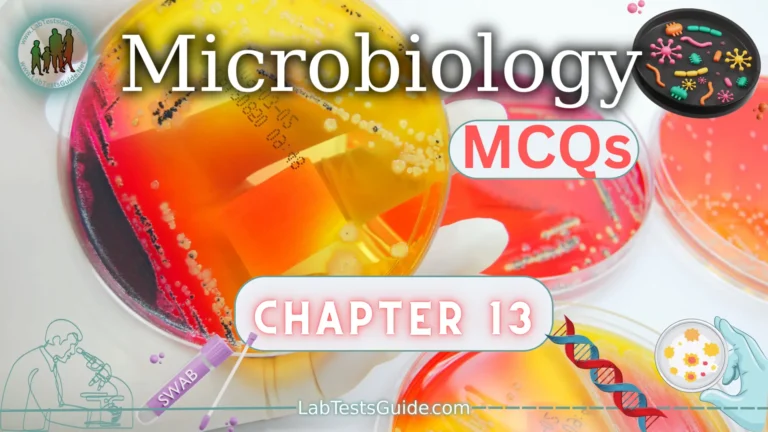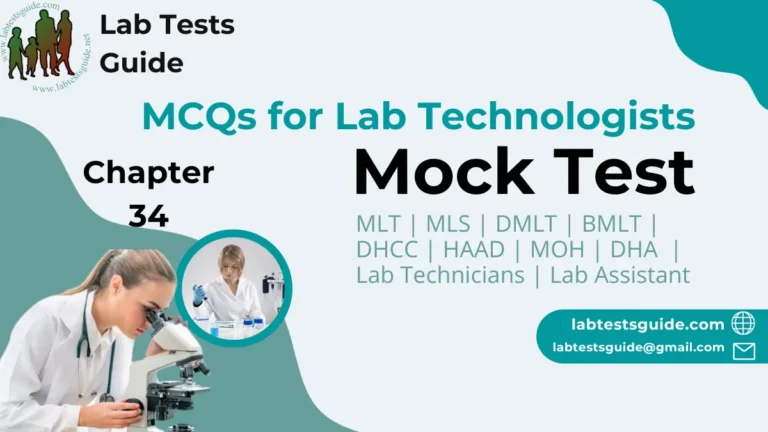4201 to 4250 MCQs for Lab Technician and Technologist Exam Preparation
5000 Plus MCQs for Lab Technician and Technologists are designed to test the knowledge and proficiency of laboratory professionals who work in the field of clinical laboratory science. These questions cover a wide range of topics related to laboratory science, including anatomy, physiology, microbiology, chemistry, and hematology.

4201 to 4250 MCQs for Lab Technician and Technologist Exam Preparation
If You like then share this to your friends and other social media.
If You have any question and suggestions then please Contact us Here
Questions 4201 to 4250
- Which hormone is primarily responsible for regulating thyroid function?
- Thyroid-stimulating hormone (TSH) ✔️
- Thyroxine (T4)
- Triiodothyronine (T3)
- Calcitonin
- Which thyroid hormone is the main product secreted by the thyroid gland?
- TSH
- T4 ✔️
- T3
- Thyroglobulin
- Which thyroid hormone is more biologically active?
- TSH
- T4
- T3 ✔️
- Reverse T3 (rT3)
- Which thyroid hormone is the most abundant in circulation?
- TSH
- T4 ✔️
- T3
- rT3
- TSH is produced by which gland?
- Thyroid gland
- Parathyroid gland
- Pituitary gland ✔️
- Hypothalamus
- TSH stimulates the release of which hormone from the thyroid gland ?
- T4 ✔️
- T3
- Calcitonin
- Parathyroid hormone (PTH)
- What is the normal range for TSH levels in adults ?
- 0.4-4.0 mIU/L ✔️
- 0.1-0.5 mIU/L
- 5.0-10.0 mIU/L
- 10.0-20.0 mIU/L
- Hypothyroidism is characterized by:
- Elevated TSH and low T4 levels ✔️
- Low TSH and high T4 levels
- Elevated TSH and high T4 levels
- Low TSH and low T4 levels
- Hyperthyroidism is characterized by:
- Elevated TSH and low T4 levels
- Low TSH and high T4 levels ✔️
- Elevated TSH and high T4 levels
- Low TSH and low T4 levels
- The most common cause of primary hypothyroidism is:
- Hashimoto’s thyroiditis ✔️
- Graves’ disease
- Thyroid adenoma
- Thyroid cancer
- Which thyroid function test is used to directly measure the level of unbound or free T4 hormone?
- Total T4
- Free T4 index (FT4I)
- Free thyroxine (FT4) ✔️
- TSH receptor antibodies (TRAb)
- What is the reference range for free T4 (FT4) levels?
- 0.8-2.0 ng/dL ✔️
- 4.5-11.2 µg/dL
- 0.4-4.0 mIU/L
- 10-20 µIU/mL
- Which thyroid function test is used to directly measure the level of unbound or free T3 hormone?
- Total T3
- Free T3 index (FT3I)
- Free triiodothyronine (FT3) ✔️
- Thyroid peroxidase antibodies (TPOAb)
- What is the reference range for free T3 (FT3) levels?
- 70-150 ng/dL ✔️
- 4.5-11.2 µg/dL
- 0.4-4.0 mIU/L
- 10-20 µIU/mL
- Which thyroid function test is used to assess the level of thyroid hormone-binding proteins in the blood?
- Total T4
- Total T3
- Thyroid hormone-binding ratio (THBR) ✔️
- Reverse T3 (rT3)
- A low THBR indicates:
- Hyperthyroidism ✔️
- Hypothyroidism
- Euthyroid state
- Thyroid cancer
- What is the normal range for THBR?
- 0.9-1.1 ✔️
- 1.5-2.5
- 0.4-4.0 mIU/L
- 10-20 µIU/mL
- Which thyroid function test is used to assess the binding capacity of proteins for thyroid hormones?
- Thyroid-binding globulin (TBG ✔️
- Thyroid-stimulating immunoglobulins (TSI)
- Thyroglobulin (Tg)
- Thyroid peroxidase antibodies (TPOAb)
- Thyroid-binding globulin (TBG) levels are influenced by:
- Liver function ✔️
- Kidney function
- Thyroid function
- All of the above
- An increased TBG level can lead to:
- Hypothyroidism ✔️
- Hyperthyroidism
- Euthyroid state
- Thyroid cancer
- What is the reference range for TBG levels?
- 15-35 µg/mL ✔️
- 4.5-11.2 µg/dL
- 0.4-4.0 mIU/L
- 10-20 µIU/mL
- Which thyroid function test is used to assess the presence of antibodies against thyroid peroxidase enzyme?
- Thyroid-stimulating hormone (TSH)
- Thyroid-stimulating immunoglobulins (TSI)
- Thyroglobulin (Tg)
- Thyroid peroxidase antibodies (TPOAb) ✔️
- Elevated levels of TPOAb indicate:
- Hyperthyroidism
- Hypothyroidism
- Autoimmune thyroid disease ✔️
- Thyroid cancer
- What is the normal range for TPOAb levels?
- <9 IU/mL ✔️
- <0.4 ng/dL
- <0.1 µIU/mL
- <10 U/mL
- Which thyroid function test is used to evaluate thyroid function during pregnancy?
- Total T4
- Total T3
- Free T4
- Thyroid-stimulating hormone (TSH) ✔️
- During pregnancy, TSH levels are typically:
- Decreased
- Increased ✔️
- Unchanged
- Fluctuating
- Which thyroid function test is used to assess the thyroid gland’s ability to concentrate iodine?
- Radioactive iodine uptake (RAIU) ✔️
- Thyroglobulin (Tg)
- Thyroid-stimulating immunoglobulins (TSI)
- Thyroid peroxidase antibodies (TPOAb)
- RAIU is commonly used to diagnose:
- Hyperthyroidism ✔️
- Hypothyroidism
- Thyroid nodules
- Thyroid cancer
- A high RAIU suggests:
- Hyperthyroidism ✔️
- Hypothyroidism
- Euthyroid state
- Thyroid cancer
- What is the normal range for RAIU?
- 5-15%
- 20-40% ✔️
- 0.4-4.0 mIU/L
- 10-20 µIU/mL
- Which thyroid function test is used to assess the presence of thyroid-stimulating immunoglobulins?
- Thyroid-stimulating hormone (TSH)
- Thyroid-stimulating immunoglobulins (TSI) ✔️
- Thyroglobulin (Tg)
- Thyroid peroxidase antibodies (TPOAb)
- Elevated TSI levels are indicative of:
- Hyperthyroidism ✔️
- Hypothyroidism
- Autoimmune thyroid disease
- Thyroid cancer
- What is the reference range for TSI levels?
- <140% ✔️
- <10 IU/mL
- <0.4 ng/dL
- <10 U/mL
- Which thyroid function test is used to assess the presence of thyroglobulin in the blood?
- Thyroid-stimulating hormone (TSH)
- Thyroid-stimulating immunoglobulins (TSI)
- Thyroglobulin (Tg) ✔️
- Thyroid peroxidase antibodies (TPOAb)
- Elevated levels of thyroglobulin are often seen in:
- Hyperthyroidism
- Hypothyroidism
- Thyroid nodules
- Thyroid cancer ✔️
- What is the reference range for thyroglobulin (Tg) levels?
- <2 ng/mL ✔️
- <9 IU/mL
- <0.4 ng/dL
- <10 U/mL
- Which thyroid function test is used to assess the thyroid gland’s ability to trap and organify iodine?
- Radioactive iodine uptake (RAIU) ✔️
- Thyroid-stimulating hormone (TSH)
- Thyroglobulin (Tg)
- Thyroid peroxidase antibodies (TPOAb)
- Which thyroid function test is used to evaluate thyroid function in newborns?
- Total T4
- Total T3
- Free T4
- Thyroid-stimulating hormone (TSH) ✔️
- Congenital hypothyroidism is commonly detected by:
- Elevated TSH and low T4 levels ✔️
- Low TSH and high T4 levels
- Elevated TSH and high T4 levels
- Low TSH and low T4 levels
- Which thyroid function test is used to assess the uptake and metabolism of T4 by the peripheral tissues?
- Reverse T3 (rT3)
- Thyroid-stimulating hormone (TSH)
- Triiodothyronine (T3) uptake ✔️
- Thyroid-stimulating immunoglobulins (TSI)
- What is the reference range for T3 uptake?
- 25-35% ✔️
- 4.5-11.2 µg/dL
- 0.4-4.0 mIU/L
- 10-20 µIU/mL
- Which thyroid function test is used to assess the conversion of T4 to T3?
- Reverse T3 (rT3) ✔️
- Thyroid-stimulating hormone (TSH)
- Total T4
- Thyroid peroxidase antibodies (TPOAb)
- Elevated levels of reverse T3 (rT3) may indicate:
- Hyperthyroidism
- Hypothyroidism
- Euthyroid sick syndrome ✔️
- Thyroid cancer
- What is the reference range for reverse T3 (rT3) levels?
- 8-25 ng/dL ✔️
- 4.5-11.2 µg/dL
- 0.4-4.0 mIU/L
- 10-20 µIU/mL
- Which thyroid function test is used to assess the level of calcitonin hormone?
- Total T4
- Total T3
- Calcitonin ✔️
- Thyroglobulin (Tg)
- Elevated levels of calcitonin are associated with:
- Hyperthyroidism
- Hypothyroidism
- Thyroid nodules
- Thyroid cancer (medullary carcinoma) ✔️
- What is the normal range for calcitonin levels?
- <10 pg/mL ✔️
- <9 IU/mL
- <0.4 ng/dL
- <10 U/mL
- Which thyroid function test is used to assess the level of antithyroglobulin antibodies?
- Thyroid-stimulating hormone (TSH)
- Thyroid-stimulating immunoglobulins (TSI)
- Thyroglobulin (Tg)
- Antithyroglobulin antibodies (TgAb) ✔️
- Elevated levels of antithyroglobulin antibodies are associated with:
- Hyperthyroidism
- Hypothyroidism
- Autoimmune thyroid disease ✔️
- Thyroid cancer
- What is the normal range for antithyroglobulin antibodies (TgAb) levels?
- <20 IU/mL ✔️
- <9 IU/mL
- <0.4 ng/dL
- <10 U/mL
The questions are typically designed to assess the technical skills and knowledge required for the laboratory profession, including the ability to analyze laboratory test results, perform laboratory procedures, and maintain laboratory equipment.
To prepare for these MCQs, candidates should have a thorough understanding of the key concepts and principles of laboratory science. They should also be familiar with common laboratory equipment and procedures, as well as laboratory safety protocols.
Candidates may also benefit from studying specific laboratory science textbooks or taking online courses that cover the material tested in the MCQs. Additionally, practicing sample MCQs and reviewing the answers can help candidates identify areas where they may need to improve their knowledge or skills.
Overall, the MCQs for lab technologists are designed to be challenging and comprehensive, requiring candidates to demonstrate a high level of proficiency in the field of laboratory science.







